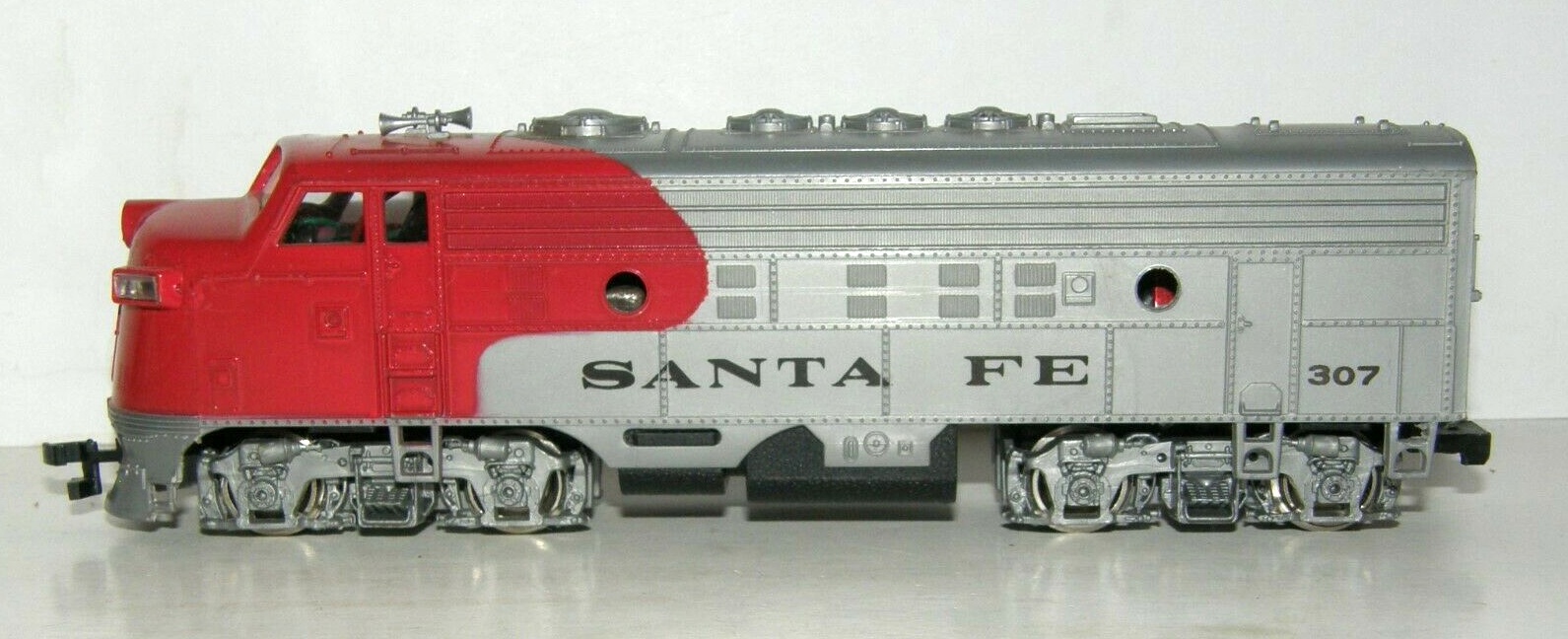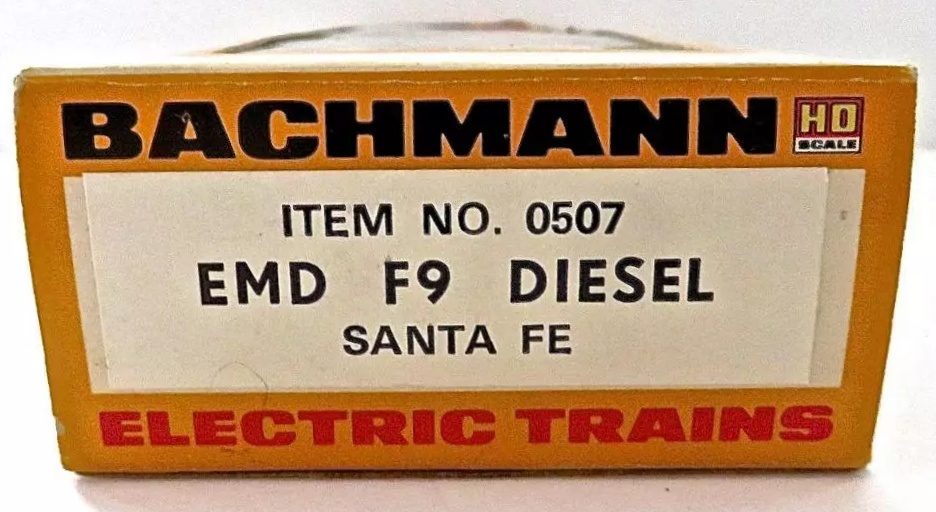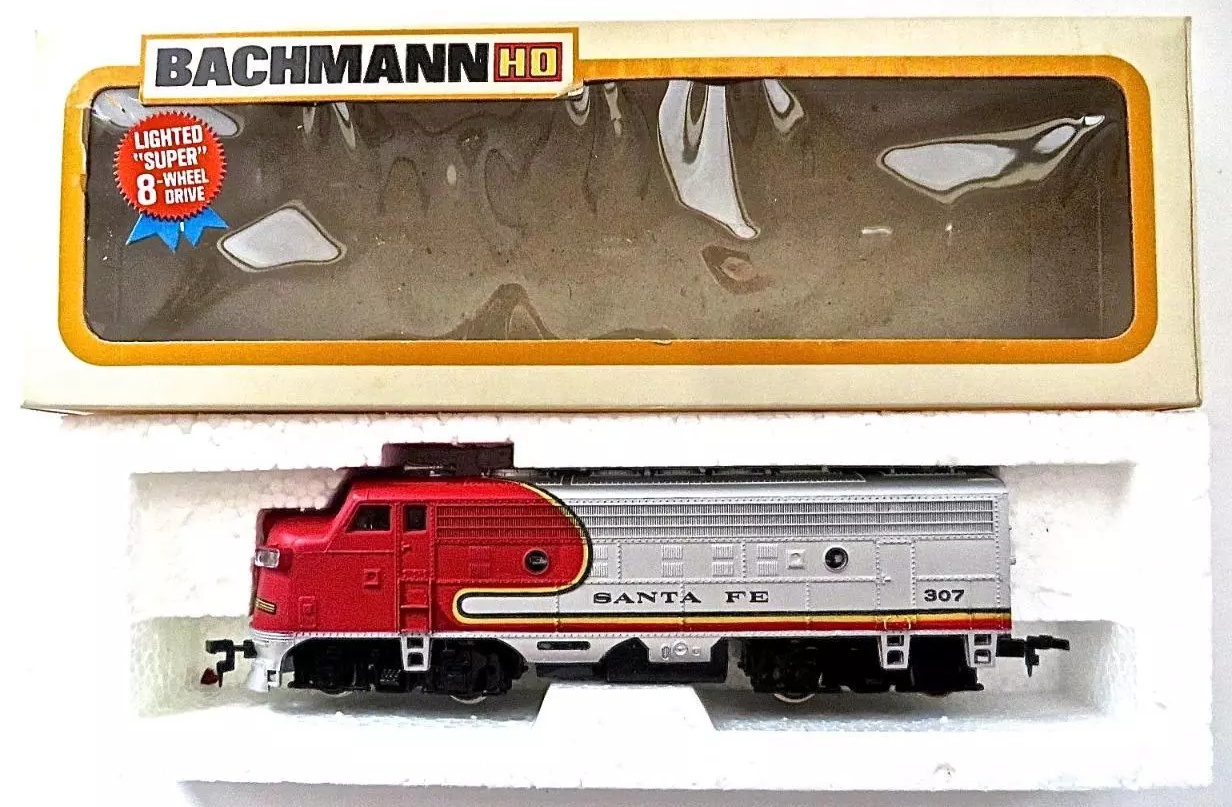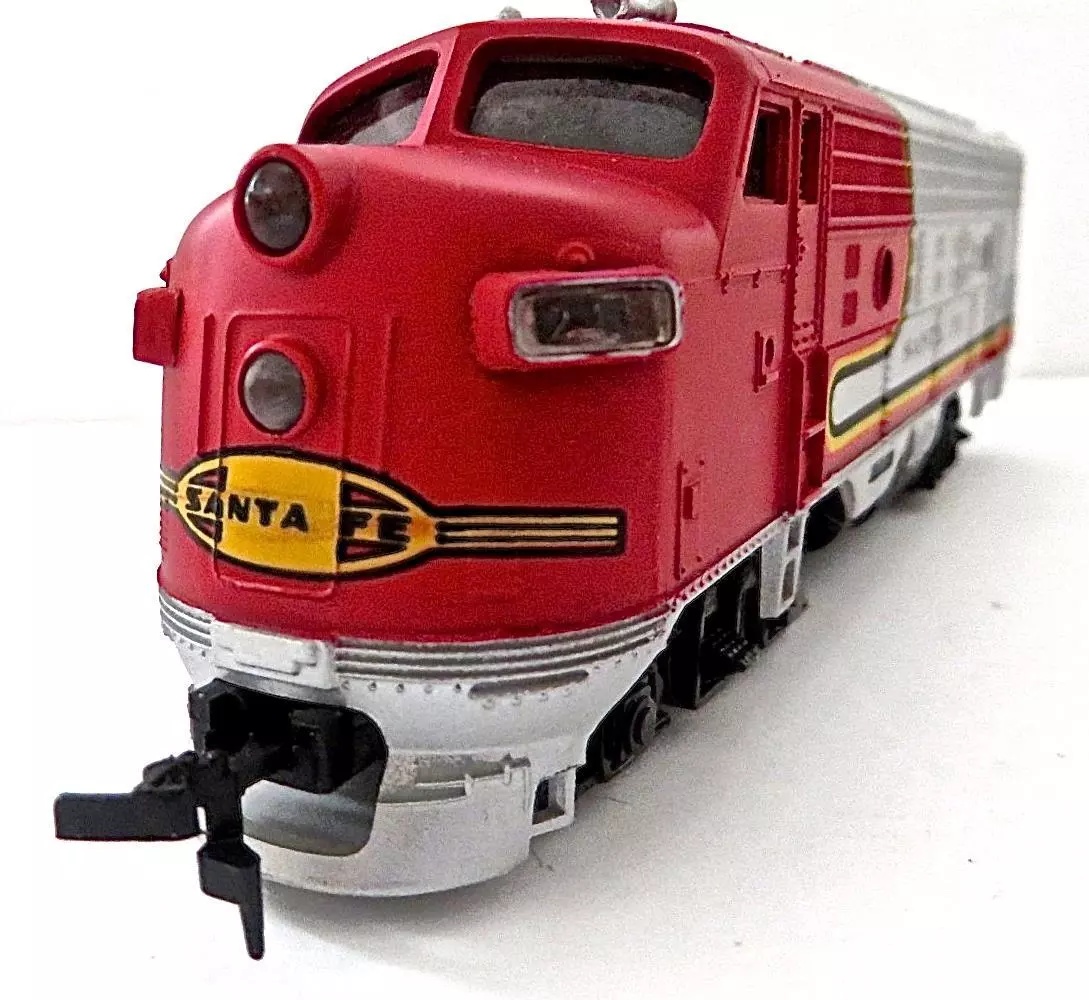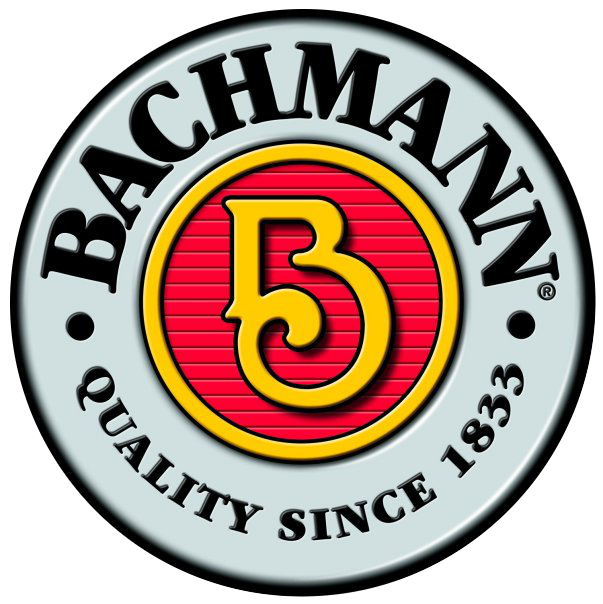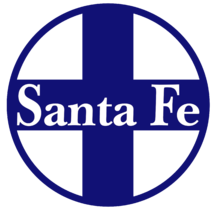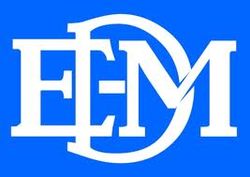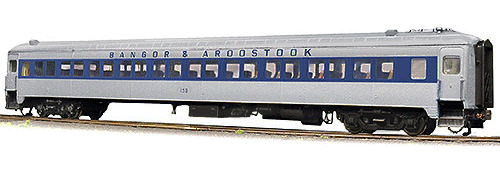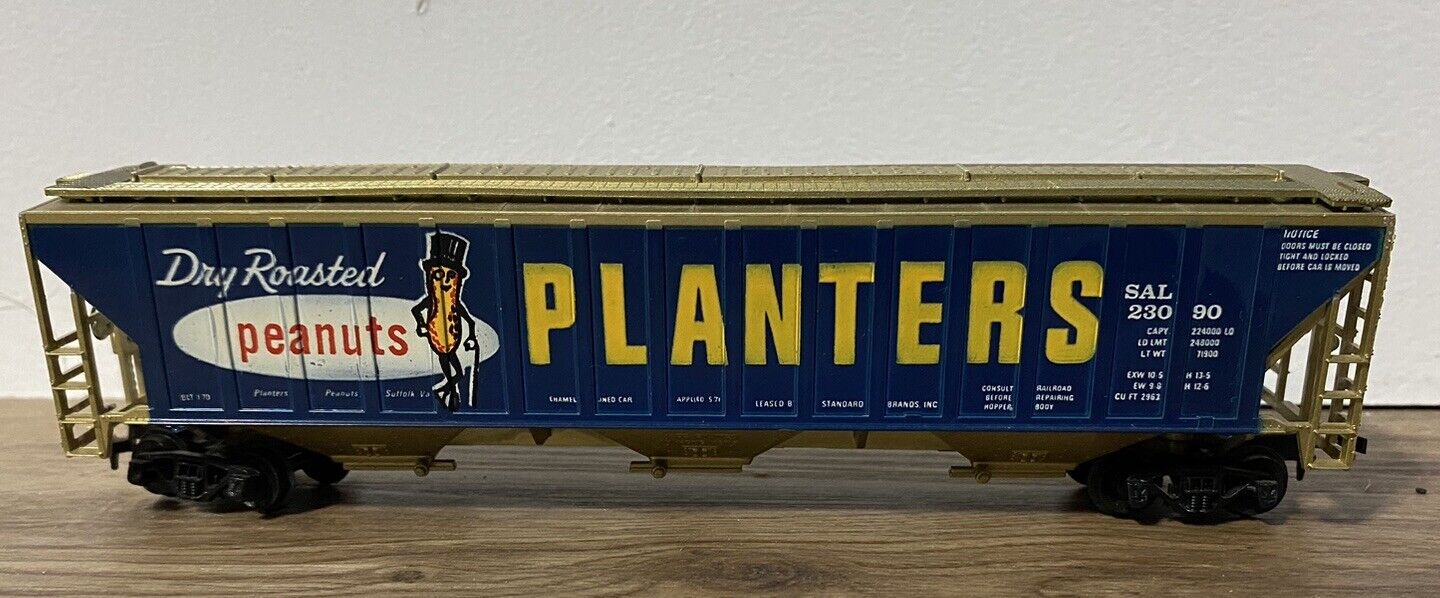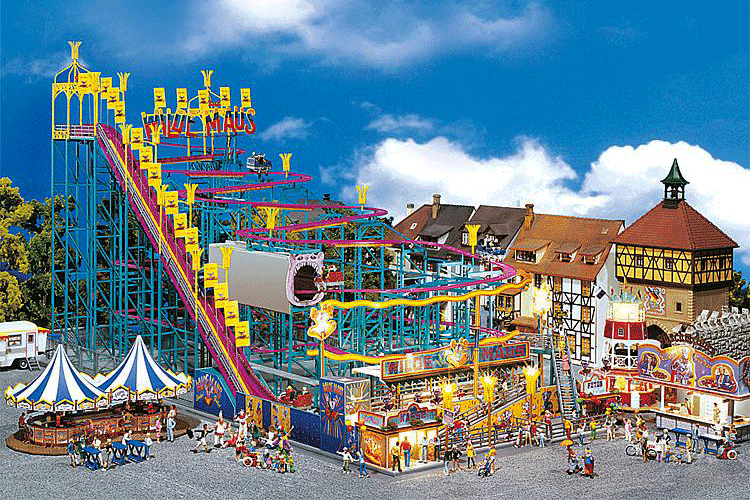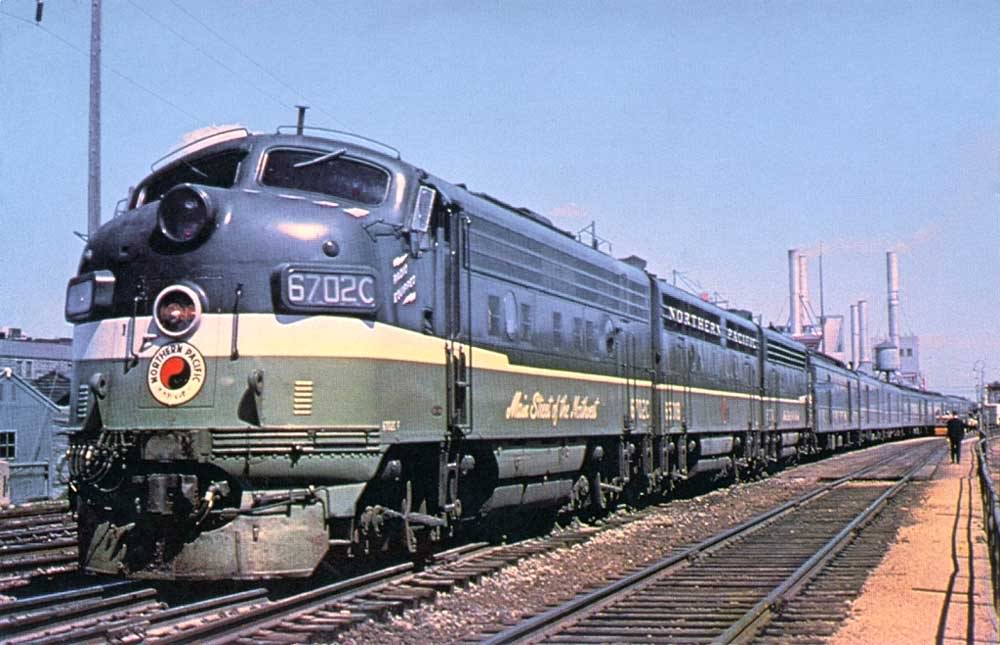General Information About Item: Stock number evolution over time:
- [1970 catalog] 0507 Powered ($10.98), 0527 Dummy ($3.98)
- [1983 catalog] 41-615-02 ($18.00)
- [1990's] 61502
- [1970 catalog] 0507 Powered ($10.98), 0527 Dummy ($3.98)
- [1983 catalog] 41-615-02 ($18.00)
- [1990's] 61502
Body Style Information: One of the two first HO scale locomotives introduced by Bachmann in 1970 (the other one being a GP40).
Features:
- 8 wheel gear drive
- Operating headlight
- Super detailed (said Bachmann at the time)
- Die cast chassis
- Truck-mounted couplers
- Available as Powered or Dummy unit (both A units)
Actually this is rather a F7, given the lack of filter grille ahead of the first porthole, that is the distinctive feature between F7 and F9. But as Bachmann refers to this model as F9, we do the same.
Features:
- 8 wheel gear drive
- Operating headlight
- Super detailed (said Bachmann at the time)
- Die cast chassis
- Truck-mounted couplers
- Available as Powered or Dummy unit (both A units)
Actually this is rather a F7, given the lack of filter grille ahead of the first porthole, that is the distinctive feature between F7 and F9. But as Bachmann refers to this model as F9, we do the same.
DCC Information: No DCC compatibility given the 1970s design.
Prototype Information: The EMD F9 was a 1,750 horsepower (1,300 kW) Diesel-electric locomotive produced between February 1953 and May 1960 by the Electro-Motive Division of General Motors (EMD) and General Motors Diesel (GMD). It succeeded the F7 model in GM-EMD's F-unit sequence. Final assembly was at GM-EMD's La Grange, Illinois plant. The F9 was also built in Canada by General Motors Diesel at their London, Ontario plant. A total of 100 cab-equipped lead A units and 154 cabless booster B units were built. The F9 was the fifth model in GM-EMD's highly successful "F" series of cab unit diesel locomotives.
A F9 can be distinguished reliably from a late F7 only by the addition of an extra filter grille ahead of the front porthole on the side panels on A units. Internally, the use of an 567C prime mover increased power to 1,750 hp from the F7's 1,500 hp.
By the time cab units such as the F9 were built, railroads were turning to the road switcher-style of locomotive, and the F9 was succeeded in most part by the EMD GP9.
From Wikipedia
A F9 can be distinguished reliably from a late F7 only by the addition of an extra filter grille ahead of the front porthole on the side panels on A units. Internally, the use of an 567C prime mover increased power to 1,750 hp from the F7's 1,500 hp.
By the time cab units such as the F9 were built, railroads were turning to the road switcher-style of locomotive, and the F9 was succeeded in most part by the EMD GP9.
From Wikipedia
Road/Company Information: The Atchison, Topeka and Santa Fe Railway (reporting mark ATSF), often abbreviated as Santa Fe or AT&SF, was one of the larger railroads in the United States. Chartered in February 1859, the railroad reached the Kansas-Colorado border in 1873 and Pueblo, Colorado, in 1876. To create a demand for its services, the railroad set up real estate offices and sold farm land from the land grants that it was awarded by Congress. Despite the name, its main line never served Santa Fe, New Mexico, as the terrain was too difficult; the town ultimately was reached by a branch line from Lamy.
The Santa Fe was a pioneer in intermodal freight transport, an enterprise that (at one time or another) included a tugboat fleet and an airline (the short-lived Santa Fe Skyway). Its bus line extended passenger transportation to areas not accessible by rail, and ferryboats on the San Francisco Bay allowed travelers to complete their westward journeys to the Pacific Ocean. The ATSF was the subject of a popular song, Harry Warren & Johnny Mercer's "On the Atchison, Topeka and the Santa Fe", written for the film, The Harvey Girls (1946).
The railroad officially ceased operations on December 31, 1996, when it merged with the Burlington Northern Railroad to form the Burlington Northern & Santa Fe Railway.
Read more on Wikipedia.
The Santa Fe was a pioneer in intermodal freight transport, an enterprise that (at one time or another) included a tugboat fleet and an airline (the short-lived Santa Fe Skyway). Its bus line extended passenger transportation to areas not accessible by rail, and ferryboats on the San Francisco Bay allowed travelers to complete their westward journeys to the Pacific Ocean. The ATSF was the subject of a popular song, Harry Warren & Johnny Mercer's "On the Atchison, Topeka and the Santa Fe", written for the film, The Harvey Girls (1946).
The railroad officially ceased operations on December 31, 1996, when it merged with the Burlington Northern Railroad to form the Burlington Northern & Santa Fe Railway.
Read more on Wikipedia.
Brand/Importer Information: Bachmann Industries (Bachmann Brothers, Inc.) is a Bermuda registered Chinese owned company, globally headquartered in Hong Kong; specialising in model railroading.
Founded in Philadelphia, Pennsylvania, the home of its North American headquarters, Bachmann is today part of the Kader group, who model products are made at a Chinese Government joint-venture plant in Dongguan, China. Bachmann's brand is the largest seller, in terms of volume, of model trains in the world.[citation needed] Bachmann primarily specializes in entry level train sets, and premium offerings in many scales. The Spectrum line is the high quality, model railroad product line, offered in N, HO, Large Scale, On30, and Williams O gauge all aimed for the hobbyist market. Bachmann is the producer of the famous railroad village product line known as "Plasticville." The turnover for Bachmann model trains for the year ended 31 December 2006 was approximately $46.87 million, a slight increase of 3.36% as compared to 2005.
Founded in Philadelphia, Pennsylvania, the home of its North American headquarters, Bachmann is today part of the Kader group, who model products are made at a Chinese Government joint-venture plant in Dongguan, China. Bachmann's brand is the largest seller, in terms of volume, of model trains in the world.[citation needed] Bachmann primarily specializes in entry level train sets, and premium offerings in many scales. The Spectrum line is the high quality, model railroad product line, offered in N, HO, Large Scale, On30, and Williams O gauge all aimed for the hobbyist market. Bachmann is the producer of the famous railroad village product line known as "Plasticville." The turnover for Bachmann model trains for the year ended 31 December 2006 was approximately $46.87 million, a slight increase of 3.36% as compared to 2005.
Manufacturer Information: Bachmann Industries (Bachmann Brothers, Inc.) is a Bermuda registered Chinese owned company, globally headquartered in Hong Kong; specialising in model railroading.
Founded in Philadelphia, Pennsylvania, the home of its North American headquarters, Bachmann is today part of the Kader group, who model products are made at a Chinese Government joint-venture plant in Dongguan, China. Bachmann's brand is the largest seller, in terms of volume, of model trains in the world.[citation needed] Bachmann primarily specializes in entry level train sets, and premium offerings in many scales. The Spectrum line is the high quality, model railroad product line, offered in N, HO, Large Scale, On30, and Williams O gauge all aimed for the hobbyist market. Bachmann is the producer of the famous railroad village product line known as "Plasticville." The turnover for Bachmann model trains for the year ended 31 December 2006 was approximately $46.87 million, a slight increase of 3.36% as compared to 2005.
Founded in Philadelphia, Pennsylvania, the home of its North American headquarters, Bachmann is today part of the Kader group, who model products are made at a Chinese Government joint-venture plant in Dongguan, China. Bachmann's brand is the largest seller, in terms of volume, of model trains in the world.[citation needed] Bachmann primarily specializes in entry level train sets, and premium offerings in many scales. The Spectrum line is the high quality, model railroad product line, offered in N, HO, Large Scale, On30, and Williams O gauge all aimed for the hobbyist market. Bachmann is the producer of the famous railroad village product line known as "Plasticville." The turnover for Bachmann model trains for the year ended 31 December 2006 was approximately $46.87 million, a slight increase of 3.36% as compared to 2005.
Item created by: luchestr on 2022-04-24 12:42:58. Last edited by Alain LM on 2024-08-09 15:23:23
If you see errors or missing data in this entry, please feel free to log in and edit it. Anyone with a Gmail account can log in instantly.
If you see errors or missing data in this entry, please feel free to log in and edit it. Anyone with a Gmail account can log in instantly.


